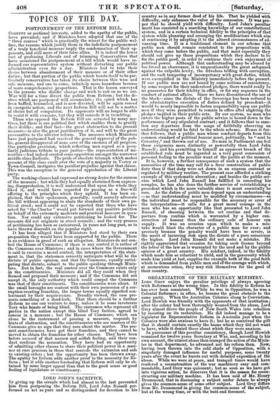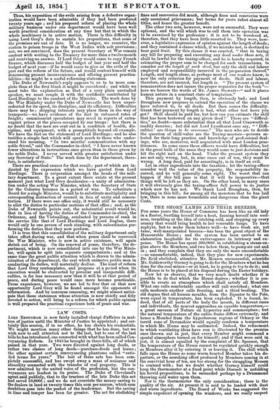ORGANIZATION OF THE MILITARY MINISTRY. LORD GREY enjoys the peculiar
privilege of always agreeing with Reformers at the wrong time. In this fidelity to Reform he has ever been consistent. While he was in Opposition, he was a Colonial Reformer; in office, he became the great obstacle to the same party. When the Australian Colonies clung to Convictism, Lord liowick was fiiendly with the opponents of that institution; after the colony had been thoroughly weaned from the abuse Lord Grey almost drove the people of New South Wales into rebellion by insisting on its restoration. He did indeed manage to be a legislator for Representative Reform in Australia just when the Colonies were also anxious to have it; but he so contrived the gift that it should contain exactly the boons which they did not want to have, while it denied those about which they were anxious. In pursuance of this peculiar consistency, though Lord Howick remained for twelve years Secretary at War, and, according to his own account, the utmost abuse then cramped the action of the Minis- ter in that department, he advanced not his reform then. Itow, having been thrown into the cold shade of Opposition, with a singularly damaged influence for useful purposes, some twenty years after the event he bursts out with detailed exposition of the abuse. While we were.at peace, and tranquil times would have rendered a reconstruction of the war machinery easy and com- mendable, Lord Grey wes quiescent ; but as soon as we have got into vigorous action, he discovers that it is the season for recon- structing Our military machine. It has been said of Mr. Henry Drummond, that in discussing a subject under debate he always gives the common-sense of some other subject. Lord Grey differs from Mr. Drummond in giving the common-sense of the subject, but at the wrong time, or with the butt-end foremost.
Thus, his exposition of the evils arising from a defective organ- ization would have been admirable if they had been produced twenty years ago ; and his proposed reform of placing the whole military business under one department would have been well worth practical consideration at any time but that in which the whole machinery is in active motion. There is this difficulty in using Lord Grey's data to sustain his propositions, that some of the premises are out of date. It is no longer, we conceive, the custom to poison troops in the West Indies with salt provisions ; nor, we are convinced, does the present Secretary at War remain content with writing to the Treasury for more than a twelvemonth and receiving no answer. If Lord Grey would cease to copy French finance, which discusses half the budget of last year and half the budget of next year—if he would cease to give us the evils of the past and the reform of the future, and would content himself with denouncing present inconveniences and offering present praotica- bilities—he might be a useful reforming statesman. The Duke of Newcastle's reply appears to us to be more com- plete than at the first blush it might be considered ; and while we must take the explanation as that of a very plain unstudied speaker, we must couple it with the certificate contributed by Lord Hardinge to the conduct of the Minister. The work done by the War Ministry under the Duke of Newcastle has been unpre- cedented for its speed, its discipline, and its efficiency. Difficulties there may be ; shipping interests may place them in the way of transports—we have evidence of the fact in enhanced rates of freight; commissariat speculators may revel in reports of extra- vagant prices at the places occupied by our troops : but there is no doubt that the men are sent out in a condition of health, dis- cipline, and equipment, with a promptitude beyond all example. We have the fact on the statement of Lord Harding° ; and he also testifies a simple fact which will speak much to those who under- stand his meaning. "In two months' communication with my noble friend," said the Commander-in-chief, "I have never known fewer alterations in instructions once given than in those given by the noble Duke. I never served with greater satisfaction under any Secretary of State." The work done by the department, there- fore, is satisfactory.
There are practical causes for that result; part of which are in- dicated . by the expression which we have quoted from Lord i Hardinge. There s cooperation amongst the heads of the mili- tary department. To a great extent there exists at the present moment just what Lord Grey desiderates— a unity of administra- tion under the acting War Minister, which the Secretary of State for the Colonies becomes in a period of war. To substitute a Board for a single Minister, would be to substitute multiplicity and corresponding distraction of council in lieu of unity and concen- tration. If there were one office only, it would still be necessary to allot the duties to particular sections of that office ; and, as the Duke of Newcastle points out, the substantial result would be, that in lieu of having the duties of the Commander-in-chief, the Ordnance, and the Victualling, conducted by persons of rank in the service like that of Lord Hardinge and Lord Raglan, there would only be one person of such standing, with subordinates per- forming the duties that they now perform.
It is true that this consolidation of the military department only takes effect during war, and that when peace shall be recovered the War Minister, who is now in active existence, will again shrink out of being. On the renewal of peace, therefore, the de- partment, which is now consolidated into one by the War Minis- ter, will again be split into separate compartments ; and at the same time the great public attention which is drawn to the admin- istration of the department, the zeal which animates public men in conducting its duties, will materially decline. The kind of reform that Lord Grey contemplates and proposes at a peiiod when its execution would be obstructed by peculiar and insuperable diffi- culties, is far less necessary now than it will be at that period of peace, and during peace would once more become practicable. From experience, however, we are led to fear that on that new opportunity Lord Grey will be found amongst the opponents of reformation. And by converse reasoning, we might almost antici- pate that those statesmen whose attention is now chiefly and fitly devoted to action, will bring to a reform for which public opinion is well prepared the practical experience both of peace and war.



























 Previous page
Previous page